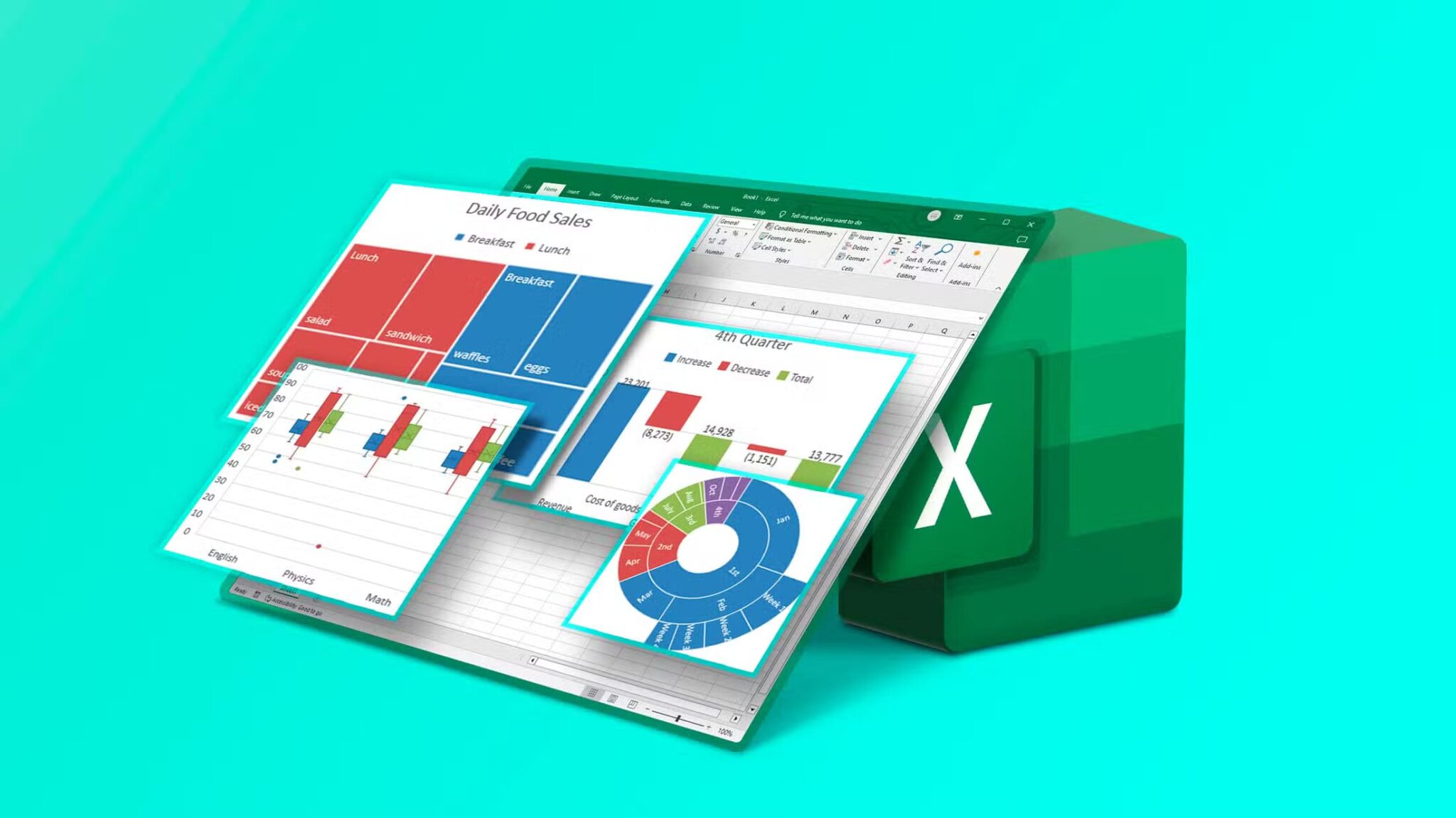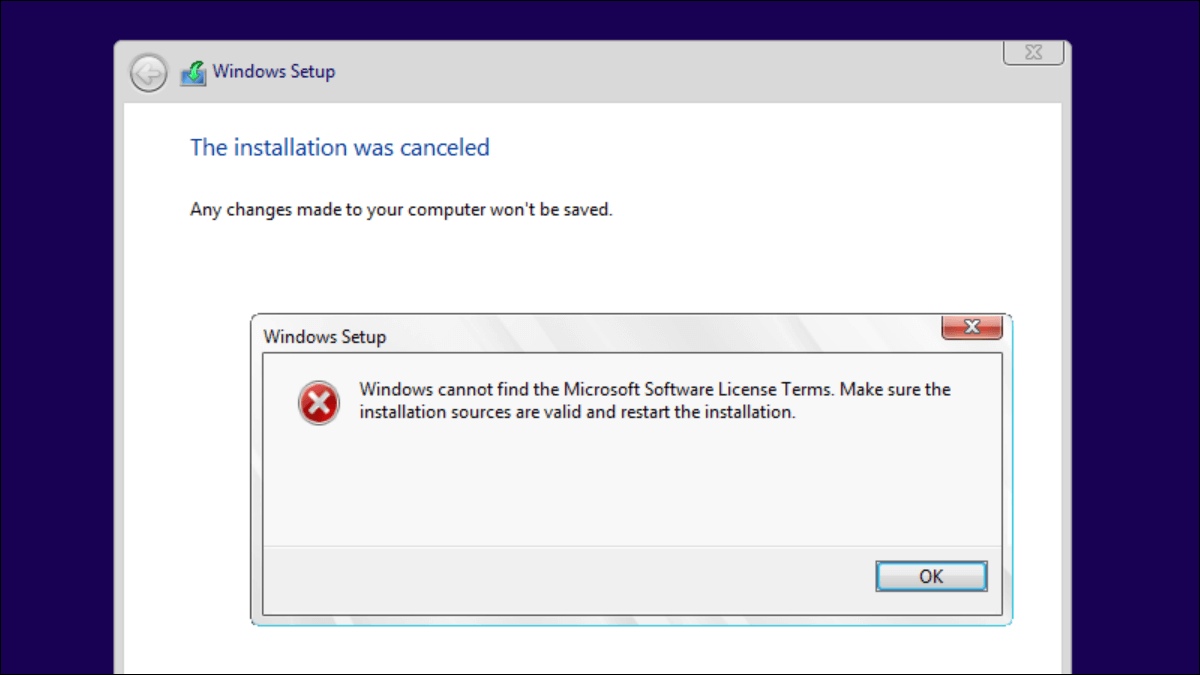Chrome Flags come and go at a rapid rate, with some becoming full browser features while others disappear forever. These features have been appropriately renamed to "Experiences" Because it allows you to try out and test experimental features, there are plenty of Chrome Flags you can set to boost your browser's performance. These are the best current Chrome Flags you should enable right now.

Note: We update this list regularly to ensure the tags we include are still available, but occasionally an outdated tag may slip through the net. If this happens, let us know in the comments, and we'll remove it.
How to access and enable Chrome Flags
Follow these steps to view and enable Chrome Flags:
- Type chrome :/ / flags In the Chrome address bar, tap Enter.
- You'll see a Chrome Flags list with a warning that features are unstable.
- Use the search bar at the top to find the flag you want. Once you find it, click the drop-down box next to it to enable or disable the flag.
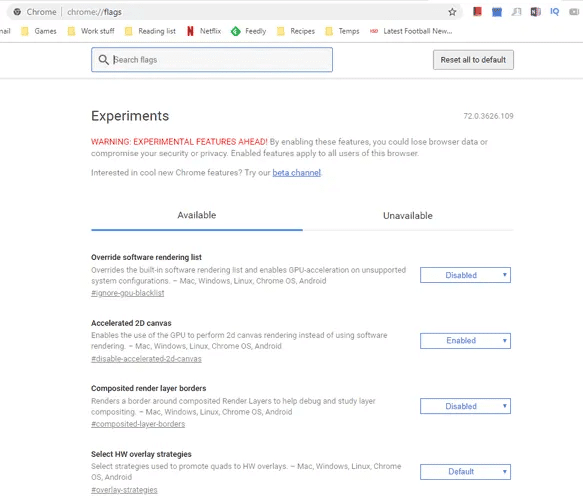
4. Click the button "Reboot" To restart Chrome and activate or deactivate the flag.
Helpful Hint: If you're considering using incognito mode, read first. How to enable Incognito mode.
1. Disable system notifications
There are two types of notifications that Chrome can send to your computer: some are native within Chrome, and will only appear when Chrome is running, and others are specific to your operating system and will appear within the operating system's user interface.
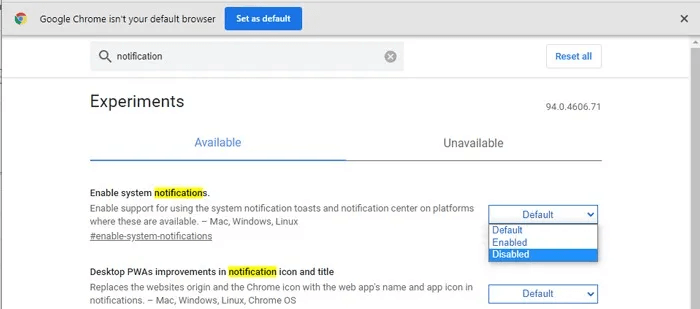
Many people find these notifications annoying, so you may want to disable them in Chrome Flags.
In the tags search box, type System notifications Then when it appears, set Enable system notifications on “disabled”No more interruptions!
Advice: get to know me How to Customize Chrome Like a Pro.
2. Silent authorization chip
Make no mistake, the permissions notification in browsers is very important, asking you if you are happy for a particular site to access your location, microphone, and everything else.
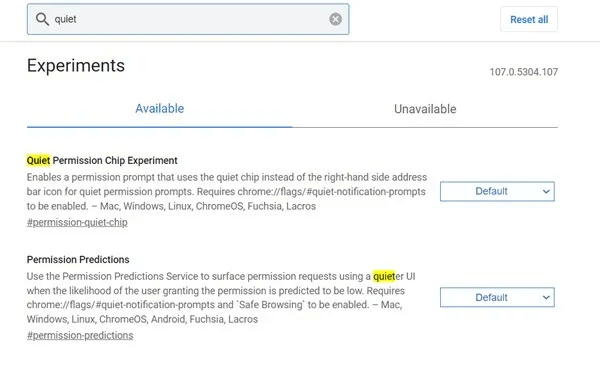
But the notification in Chrome has always been ugly and a bit intrusive. This flag addresses this problem by integrating the permissions box into the search bar. It's nice and clear with a bright blue background, so there's no chance of missing it, while not taking up much of your browsing screen space.
To enable this flag, type “quiet permission” In the search bar go to Flags and enable Quiet Permission Chip Experiment.
Tip: If you're looking to take some of the hard work out of the way, check out Chrome extensions that automate tedious browsing tasks.
3. Enable dark mode
Dark Mode It's something everyone is looking for right now, making your screen less tiring for the eyes when using it at night or in a dark environment. You can darken window borders using your operating system settings, but to make entire web pages actually dark, you'll need to enable this flag.
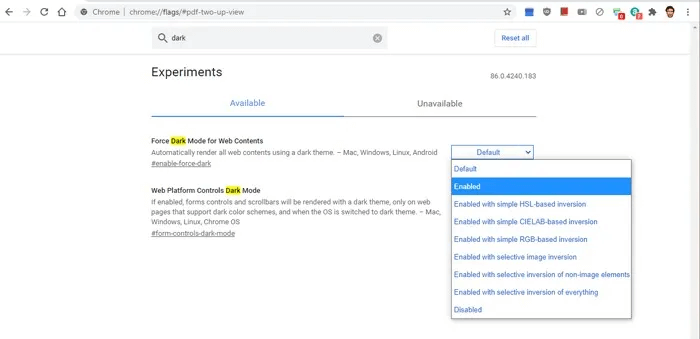
Look for Dark mode In Chrome Flags, click the drop-down menu next to “Auto Dark Mode for web content”.
You'll see that you have several different dark mode variants to choose from. You can experiment with these different dark mode variants to see which one works best, or just select "Maybe" For the default option.
4. Reader Mode
While Microsoft's development of a Chromium-based browser now includes a clickable reader mode from the URL bar, Google Chrome doesn't yet have it as a default feature. However, you can make a quick edit in Chrome Flags, and you can add a mode “Immersive Reader” To the multi-purpose box. Search for Reader Mode In the flags, then turn on the Enable Reader Mode flag.
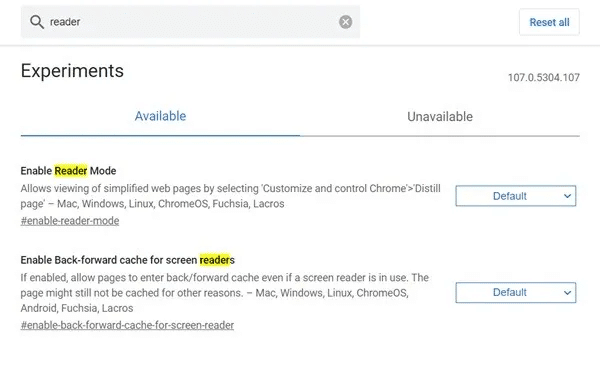
An icon will appear in your address bar. Click it to convert that page to Immersive Reader ModeYou can then click on the icon. "TO" Top of page to change Reader Settings.
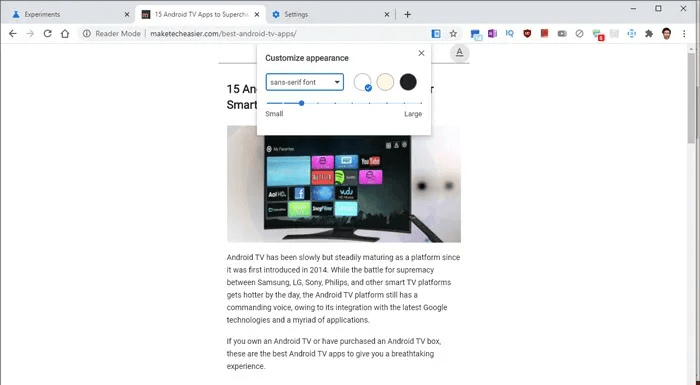
5. GPU rasterization
Chrome doesn't rely heavily on your GPU for image and data processing, but if you have a dedicated GPU, there are a few things you can do to offload some of the processing to it, speeding up the browser.
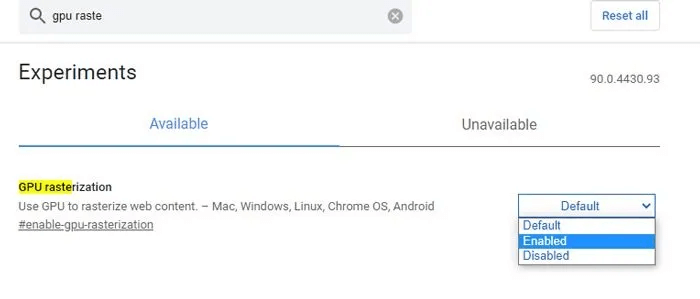
Rasterization is the process Chrome uses to organize website data into pixels, the tangible information you ultimately see on the screen in front of you. It does this by organizing each page into Squares At this point you effectively draw the information in each one to add up to the whole you see in front of you.
Enabling the GPU raster flag will always have your GPU perform the above operations instead of your CPU (or processor). This can make browsing faster if your CPU isn't particularly powerful, or conversely, if your GPU is extremely powerful.
Helpful Hint: Do you find it difficult to focus on your work while being distracted by the fun of the web? Find out How to block websites on Chrome.
6. Dot-free copying (Desktop/Android)
There are a few things you can do with rasterization through Chrome Flags, but one of the best is zero-rasterization, where the book streams rasterized work directly to the GPU's memory (or VRAM), which can run faster than using regular RAM (especially if you have 4GB or less of RAM on your computer).
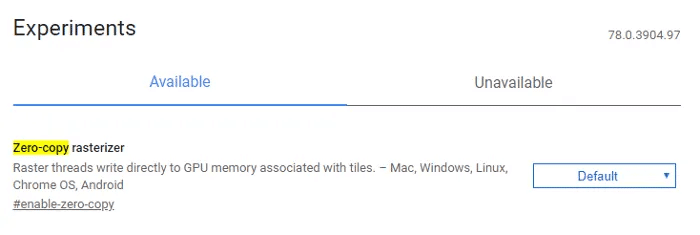
This can be particularly useful on mobile devices, with the potential to reduce battery usage when browsing the web. Search for Zero-copy rasterizer , then enable it.
7. Enable parallel downloading
There are several Chrome Flags features that can speed up browsing, and many of them are enabled by default. One such feature, which specifically speeds up your downloads, is Parallel downloading , which splits each file you download into three separate tasks, speeding up the entire process.
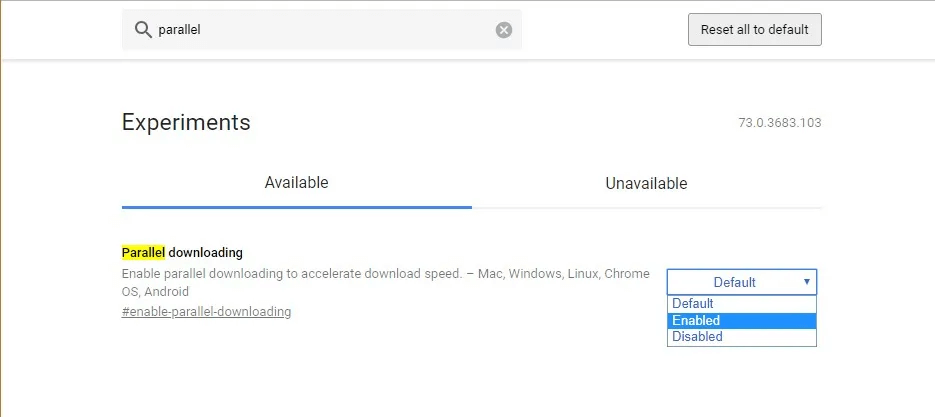
To enable it in Chrome Flags, type parallel downloading , and tap "hypothetical" When it appears in the list, then click on "Enable".
Tip: Check out Best Chrome Security and Privacy Extensions.
8. Enable smooth scrolling
As the name suggests, this allows you to scroll smoothly through content. When you scroll in Chrome using your mouse or arrow keys, there's a bit of stuttering in the animation. This makes it difficult to quickly browse through content while also reading what's important (which is bad for content skimmers). With this option enabled, smooth scrolling looks truly professional.

Just search for “Smooth Scrolling” Or type chrome://flags/#smooth-scrolling in the address bar to access it directly. Enable it using the drop-down menu.
9. Activate the experimental QUIC protocol
The QUIC protocol is a new connection protocol created by Google and is still under development. QUIC is supposed to be a faster and more secure combination of the TCP and UDP protocols. Typically, when we are on a TCP or UDP connection, it takes several trips to the server before the connection is stable (which takes time) and ready for data exchange. The main goal of the QUIC protocol is to make a single trip to establish a connection and begin the data exchange process, thereby increasing the speed of browsing and data exchange in general.

In Chrome, you can enable the QUIC protocol to start taking advantage of this protocol and speeding up browsing. Look for the check mark. “Experimental QUIC protocol” Or write chrome://flags/#enable-quick To access it directly, use the drop-down menu below to enable it.
Tip: Looking to take notes while browsing on Chrome? Check out these Chrome extensions that will let you comment on text..
10. Enable incognito screenshot
For privacy reasons, you can't take screenshots with your phone while using Chrome's Incognito mode. However, enabling the Incognito Screenshot flag allows you to take screenshots in Incognito mode as well.
Find the Incognito Screenshot tab and select Enable in the drop-down box.
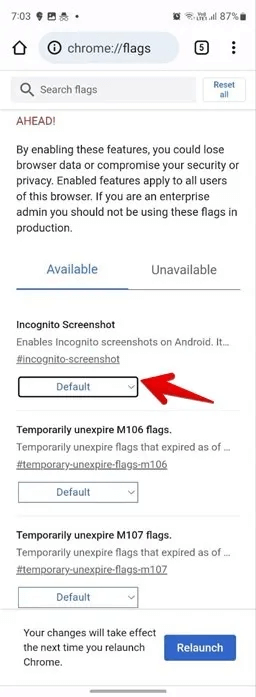
11. Enable web feeds
This tag enables the following summary in: Tab page ew for Chrome on Android phones. Under the following feed, you'll see articles from websites you've subscribed to.
To enable the web feed, look for the tag Web feed and enable it.
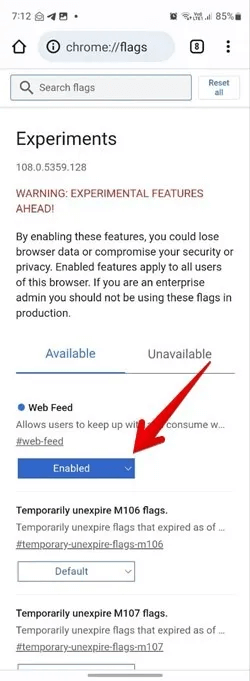
Once enabled, restart your Chrome browser, then open the website that contains the posts you want to include on your Chrome new tab page. Tap the three-dot icon at the top and select "Continue" Next to the website name. Follow other sites in the same way.
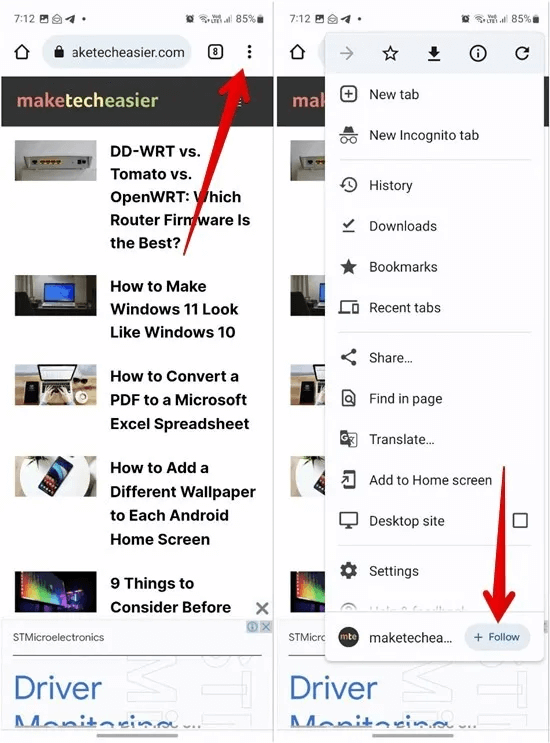
Open a new tab page to find the tab "Continue" next to "Discovery" Directly. Articles from the sites you follow will be listed below.

Frequently Asked Questions
Q1. Is it possible to reset the Chrome flag to the default value?
answer. To reset a single flag, search for it at chrome://flags, then click the drop-down box next to the flag. Choose "Default" from the menu. To reset all Chrome Flags to their default values, open chrome://flags and click the "Reset All" button at the top.
Q2. Can I use Chrome flags on my mobile phone?
answer. Yes, you can try experimental features using Chrome flags on both Android and iPhone. Check out Best Chrome Flags for Android.





